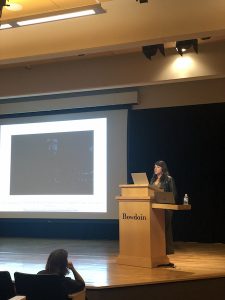Just a week after the second anniversary of Hurricane Maria hitting Puerto, Marcela Guerrero, the assistant curator at the Whitney Museum, presented What Blackouts Illuminate in Kresge Auditorium to a crowd of sixty, including students, faculty and members from the Brunswick community.
What happens when an island loses power for 170 days? Guerrero began her talk with a video addressing the discrepancy of blackouts depending on the relative socioeconomic conditions of the community which is being hit with a blackout. She compared Hurricane Harvey in Texas, where power was restored after eleven days, to Hurricane Maria in Puerto Rico, where after 170 days power was just beginning to return to pre-blackout levels. Without electricity, you can’t refrigerate your food. Without electricity, you can’t use electronic banking. Without electricity, you can’t preserve vital medicines that are temperature sensitive.
Using a variety of art pieces to highlight the detrimental effects of the blackout on the population, Guerrero brought in material crafted by Puerto Rican artists. Some notable artists include: Torres-Ferrer, Allora and Calzadilla. Their work is exhibited in Puerto Rico and throughout the United States, including the Whitney Museum, diversifying the gallery space by displaying art from a traditionally underrepresented population. Guerrero herself is Puerto Rican and is contributing to this paradigm shift in the art world through her profession.

Guerrero also addressed the dynamic between art and resistance by speaking to the recent shift in the Puerto Rican government as a result of festive protests after leaked documents revealed that corruption contributed to the delayed return of power. During the blackout, Puerto Ricans effectively took governance into their own hands and became their own first response teams. At the same time, President Trump was accusing the Puerto Rican people of “asking for too much,” despite the status of Puerto Rico as a tax-paying territory subject to American aid. Puerto Ricans took to the streets at night with lights, dancing, yoga, motor cycles, and even scuba diving, ousting Governor Ricardo Rossello, who had been in power.
Despite the tragedy Hurricane Maria brought to Puerto Rico, they found unity in the struggle. In their perseverance, their hope became a beacon of light in the darkness.